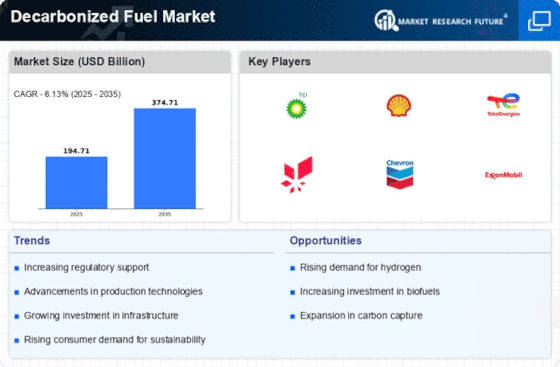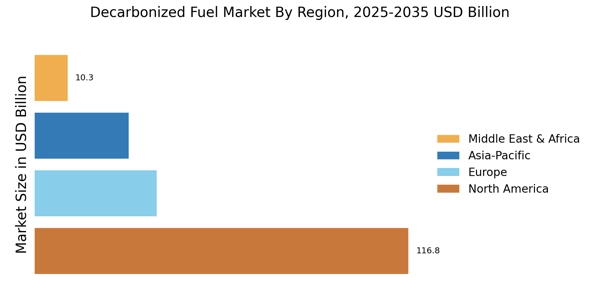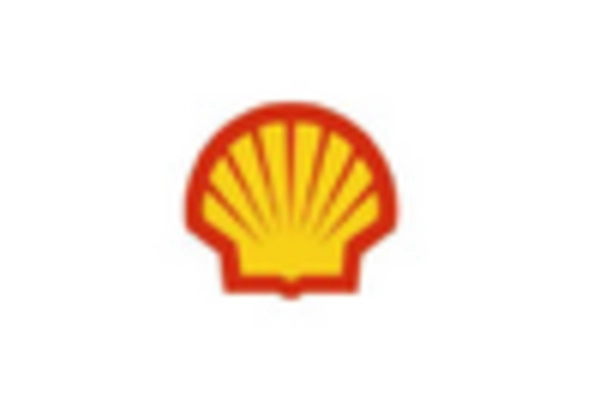Rising Consumer Awareness
The Decarbonized Fuel Market is experiencing a notable shift in consumer preferences, driven by an increasing awareness of climate change and environmental sustainability. Consumers are becoming more informed about the carbon footprint of traditional fuels and are actively seeking alternatives that align with their values. This heightened awareness is prompting a surge in demand for decarbonized fuels, as individuals and businesses alike strive to reduce their environmental impact. Market data indicates that the demand for renewable fuels has grown by approximately 20% over the past year, reflecting a significant trend towards sustainable energy solutions. As consumers prioritize eco-friendly options, the Decarbonized Fuel Market is likely to expand, fostering innovation and competition among producers.
International Climate Agreements
The Decarbonized Fuel Market is significantly influenced by international climate agreements aimed at reducing carbon emissions. Agreements such as the Paris Accord have established binding targets for countries to lower their greenhouse gas emissions, thereby creating a favorable environment for the adoption of decarbonized fuels. As nations commit to these targets, there is a growing emphasis on transitioning away from fossil fuels towards cleaner alternatives. Market data suggests that countries that have implemented stringent climate policies have seen a 15% increase in the adoption of renewable fuels. This regulatory landscape not only encourages investment in decarbonized fuel technologies but also fosters collaboration among nations to share best practices and innovations. As a result, the Decarbonized Fuel Market is likely to benefit from enhanced support and funding for sustainable fuel initiatives.
Corporate Sustainability Initiatives
In recent years, corporations across various sectors have increasingly adopted sustainability initiatives, which significantly influence the Decarbonized Fuel Market. Many companies are setting ambitious targets to reduce greenhouse gas emissions, often committing to net-zero goals by mid-century. This corporate shift is driving investments in decarbonized fuel technologies, as businesses seek to align their operations with sustainable practices. For instance, major corporations have reported a 30% increase in investments towards renewable energy sources, including decarbonized fuels. This trend not only enhances corporate reputations but also positions companies to meet regulatory requirements and consumer expectations. Consequently, the Decarbonized Fuel Market is poised for growth as businesses prioritize sustainable fuel options in their supply chains.
Advancements in Fuel Production Technologies
Technological advancements play a crucial role in shaping the Decarbonized Fuel Market. Innovations in fuel production processes, such as carbon capture and storage, biofuel production, and hydrogen generation, are enhancing the efficiency and viability of decarbonized fuels. These advancements are not only reducing production costs but also improving the overall sustainability of fuel sources. For example, recent developments in biofuel technology have led to a 25% increase in yield efficiency, making it a more attractive option for producers. As these technologies continue to evolve, they are likely to drive down prices and increase the availability of decarbonized fuels in the market. Consequently, the Decarbonized Fuel Market stands to gain from these technological breakthroughs, which may lead to a broader acceptance and integration of sustainable fuels.
Investment in Renewable Energy Infrastructure
Investment in renewable energy infrastructure is a pivotal driver for the Decarbonized Fuel Market. Governments and private entities are increasingly allocating funds towards the development of infrastructure that supports the production, distribution, and consumption of decarbonized fuels. This includes the establishment of biofuel production facilities, hydrogen refueling stations, and enhanced grid systems for renewable energy integration. Recent reports indicate that investments in renewable energy infrastructure have surged by over 40% in the last two years, reflecting a strong commitment to transitioning towards sustainable energy sources. Such investments not only facilitate the growth of the Decarbonized Fuel Market but also create jobs and stimulate economic development. As infrastructure continues to improve, the accessibility and affordability of decarbonized fuels are expected to rise, further propelling market growth.

















